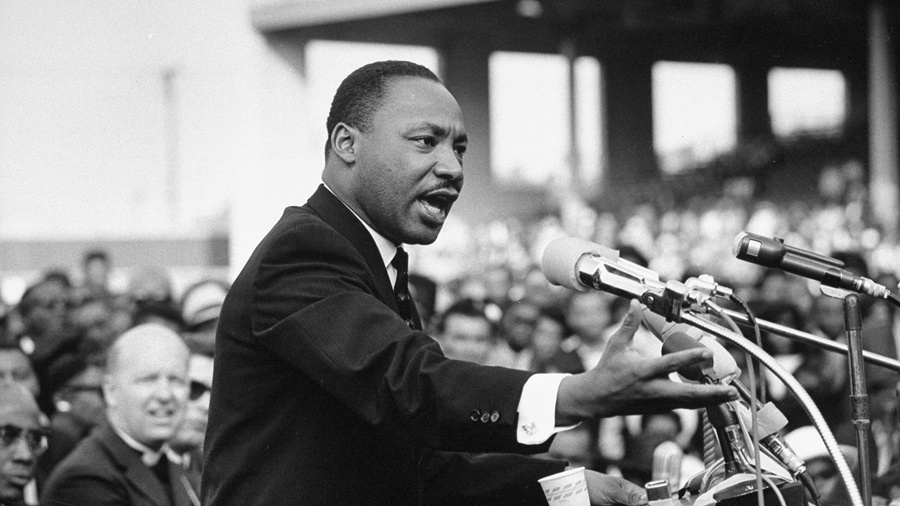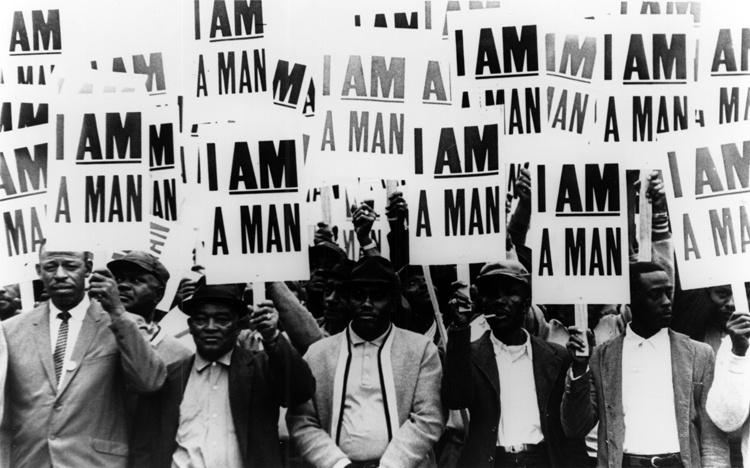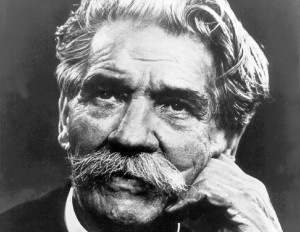
Why do I feel it necessary to publish this text this year rather than a year or two years ago ? Because of the political context. Because of Memphis and Martin Luther King, Jr. Because of Barack Obama. And may be also because of my own debt to Sartre, as being someone educated as a colonized Jew in Algeria, who managed to decipher my own cultural identity through Franz Fanon and Sartre. Finally, because of the links that I always felt existed between African American leaders and Sartre.

« I am a man » the legendary demonstration in Memphis, Tennessee, photographer: Richard L. Copley, 1968
In one of Sartre’s texts written upon his 1945 return from his first travel to the US, from which he came back fiercely mobilized against racial discrimination, using his charisma and his hegemony to express an awareness that very few intellectuals were expressing at the time, »’If you’re not a US citizen,’ I was told, ’never mention the Black issue, you might hurt the feelings of your hosts, even with the most innocent comments. And, even if you were extremely considerate, you would give the impression that you are awkwardly intruding into a family affair.’ I did mention the Black issue, however, and I do write about it today/…/ I also encountered a new spirit here. When I wondered about the fate of the Blacks, far from avoiding the conversation, most Americans hastened to give me information, to introduce me to specialists, to Black people. In this country, justly proud of its democratic institutions, one man in ten is deprived of his political rights: in this land of equality and liberty, live thirteen million untouchables; they serve you at the table, they shine your shoes, they operate your elevator, they carry your suitcases to your compartment; but they have nothing to do with you, nor you with them; they call themselves ’third class citizens’. They are the Blacks.« He ended his accusation, though, on a surprising note. “Such is today the situation of the black population in the United States. It is tragic. But it would be utterly unjust to predict the future of America from this static cut.» (see: Jean-Paul Sartre, «Ce que j’ai appris du problème noir», Le Figaro Littéraire, June 16, 1945.
Here, the description of the African Americans’ «tragic situation» is conducted in an optimistic mood, as if the country «justly proud of its democratic values», would soon be able to produce a radical change. The same hope and the same optimism are again underscored twenty years later, when Sartre refused to lecture at Cornell University because of the Vietnam war, and wished his American readers «to succeed better» in ending the Vietnam war than the progressive forces in France during Algerian war. He ended by adding something which seems to predict Obama’s election, by saying that «when the young people of America, trained by brave professors will be old enough to take hold of the common responsibilities, there is every reason to hope that a deep change will emerge both in the USA and in the world at large.» (see Jean-Paul Sartre: «Une Nuit blanche», The Nation, May 31, 1965) Those two texts, written twenty years apart, are marked by the same positive feeling for the US, whatever the period. If, in the USA of the nineteen forties, a country divided by racial segregation, Sartre became an ethical militant, it is just a few months later that, in Paris, he developed his interest in African intellectuals, when he met Alioune Diop, the founder of Présence Africaine.

Jean-Paul Sartre
Does it seem somewhat far-fetched to put a French philosopher (however a global public intellectual he might have been) in parallel with an elected American President, living almost six decades after him? In order to think about Sartre’s relationship to the US in this new century, and especially in light of the Obama presidency, I could not but help underscore uncanny similarities between the childhoods of Jean-Paul Sartre and Barack Obama, as developed in Les Mots and in Dreams from my Father. »I learned long ago to distrust my childhood and all the stories that shaped it,« Obama writes, in a striking echo to Sartre’s assertion: »After all, the reader has understood that I distrust my childhood and all that survives from it.« In the structural elements which determine the construction of their identity, one can also decipher many correspondences: born a family structure marked by the absent father who remained a myth more than a reality, both propelled toward academic excellence by their families, both supported and promoted by their unflagging mothers, with a set of grandparents (Karlémamie for Sartre, Toot and Gramps for Obama), who exercised an enormous influence during their grandson’s childhood; both covered a triangle of locations (some more mythical than others) with distinct cultures (Paris-Alsace-the South West for Sartre, Hawaii-Indonesia-Africa for Obama). Yet, there seems to be something more at stake than these biographical traces, as important as they must have been in each man’s Ausbildung. First, let’s start by recalling Martin Luther King Jr. and Obama’s philosophical references. (see: Barack Obama, Dreams from My Father, Three Rivers Press, New York, 1995, page XV; Jean-Paul Sartre, Les Mots, Gallimard, Paris, 1964.
Obama has publicly stated that his »favorite philosopher« remains Reinhold Niebuhr (1892-1971). As for King, one should also remember that he wrote his Ph. D. in 1951 on Paul Tillich (1886-1965) while being very heavily influenced by Karl Barth (1886-1968). Tillich, Barth, and Niebuhr were all Protestant ministers, as well as philosophy professors, from German or Swiss-German origin, who belonged to a tradition of what can be described as »Social Christianity,« »Dialectic Theology,« or »Messianic Protestantism,« who professed »contextual theologies,« at times revolutionary, at times third-worldist, who grounded their analysis in the observation of the man in the world, and that Niebuhr was even sometimes called a »Christian Existentialist.« These are only signs of a similar lineage between King and Obama on one side who, as American activists, refer to a certain radical theological background and Sartre on the other side who, as an existentialist philosopher from Protestant training, sometimes displayed signs of Messianism in his writings and attitudes. Even if Sartre never particularly admired his great-uncle, Dr Albert Schweitzer (1875-1965), the African Missionary in Lambaréné (Gabon) who belonged to the same tradition of German Protestantism and also received the Nobel Peace Prize in 1952, he admitted some link with him as apparent in this letter: “Dear Uncle Albert,” he wrote in 1962, “I am sorry not to be able to see you more often. We often share the same goals, without sharing the same principles; and that is the condition of a fruitful debate. You have a great experience of those under-developed countries which remain at the center of my preoccupations, and I often would like to ask you about it.» But there is more.

Dr Albert Schweitzer
When Obama, as a community organizer who had read Saul Alinsky’s Rules for Radicals, addressed the powerless in Chicago, he taught them that learning and organizing was about “shifting the balance of power” and he insisted upon the need to build collective unity. When Sartre, for his part, tried to raise student consciousness in 1968, he criticized the attitude of the academic mandarins epitomized by Raymond Aron, whom he described as someone who “possesses a power to which he desperately clings: that of imposing, on behalf of a knowledge he has accumulated, his own ideas, without allowing anyone to criticize them. But a knowledge which is not constantly criticized, constantly reappraising itself from this critique, has no value at all. The only way to learn is by challenging. /La seule façon d’apprendre, c’est de contester./ This is also the only way to become a man. For me, an intellectual is someone who is faithful to a political and social entity but who never stops challenging it.” (see: Situations VIII, “Les Bastilles de Raymond Aron,” p. 184-190, where Sartre makes the distinction between “pouvoir accordé” and “pouvoir de droit.”)
Similar contradictions can also be identified in both men’s logic by looking at the tensions between their launching of a merciless machinery of intellectual conviction and their refusal of a certain kind of recognition. In one of his dreams, dating from the year 1960 (one of the most intense of his life), answering to a Dean who had announced that credits had been voted to «erect a statue for him in the garden,» Sartre answered that «in a few years, he would be either »totally forgotten or else too famous« for having his statue in the garden (see: Annie Cohen-Solal: «Tracking Down a Willing and Reluctant Hero,» in: L’Esprit Créateur, vol. XXIX, n° 4, Susan R. Suleiman, editor, Cambridge, MA, Harvard University Press, 1989, pp. 86-96)
This anecdote echoes Obama’s comments in June 2009, when invited to deliver the Commencement speech at Arizona State University, but after some trustees had considered inappropriate that he receives an Honorary degree, because he « had not achieved enough. » «I come here not to dispute the suggestion that I have not yet achieved enough in my life,« Obama said. »I come to embrace the notion that I have not done enough in my life/…/ I heartily concur, I come to affirm that one’s title, even a title like ’President of the US’ says very little about how well one’s his life had been led, that no matter how much you’ve done, or how successful you’ve been, there is always more to do, always more to learn, and always more to achieve.” In this dialectic of extreme humility and extreme responsibility, in this call to always remain in progress, in the certainty that achievement always belongs to the future, do not we seem to hear a similar voice? We could coin it a «realistic utopia», see Percy B. Lehning, John Rawls, an Introduction, Cambridge University Press, Cambridge, 2009, where he describes the Rawlsian ideas of a «just society», of «togetherness» as the unique way to build a civil society, some notions can also undoubtedly be heard in Obama’s speeches.
YouTube, ASU Commencement Speech, 15 May 2009
As for the reaction to the Nobel Prize, when rereading Martin Luther King’s acceptance speech in 1964, it is striking to note that he accepted the award on the behalf of “a movement,” on “behalf of all men who love peace,” rather than taking it as an “honor to /himself/ personally.” The very same year, the Literature Prize went to Sartre, who declined it because of his refusal to distinguish himself from others. «I find that it is better to attempt to realize in se the human condition, in its radical form, as much as we can, than to cling to thin, specific differences, which you call, for instance, talent, which is a crime against oneself and against others, because it is to concentrate oneself exclusively on what separates. In truth, when I say that I am anybody, I mean that it is not uniquely a reality, it is also a task one should refuse all distinctive traits, in order to be able to talk on behalf of all people. And one can only talk on behalf of all people, if one is all people. We should not try to be, on the model of my damned colleagues, the sur-homme, but on the contrary, we must try to be the most human possible, that is to say, as similar as possible to others/…/ Differences are thin, and they are at the source of vanity, of ambition.[…]In this respect, the Nobel Prize would have been a small distinction, a small power, a separation.” In Barack Obama’s remarks this October, one can hear poignant echoes of King’s acceptance on “behalf” of a set of causes as well as Sartre’s refusal on behalf of a call to communal responsibility. Sartre demands that we recognize the “radical form” of the “human condition” rather than “thin, specific differences.” Obama suggests not to “allow the differences between peoples to define the way that we see one another.”
Without forcing the comparison, Sartre’s discussion of the strategies for denying difference can further illuminate Obama’s declaration, when he first downplays his own role as an individual, claiming that he does not see it as an award for his “own accomplishments,” before shifting the attention to “American leadership,” for which he is a placeholder, then broadening the scope and gesturing to the Sartrian view that an individual person can become all people. »Now, these challenges can’t be met by any one leader or any one nation,« Obama says. »And that’s why my administration’s worked to establish a new era of engagement in which all nations must take responsibility for the world we seek.« Hammering the Sartrian notions of »responsibility« and »engagement,« Obama accepts the award in the name of American leadership which itself functions on “behalf” of the “aspirations held by people in all nations.”
Behind the common humility of refusal or deferral, we can read a similar conviction in the conception of the Prize, as a tool for action. »What I would have accepted with gratefulness,” Sartre commented, “would have been the Nobel Prize after les 121, because at that time, I would not have considered it distinguishing, but as proof of solidarity. Then, I would have accepted it, not for me, but as a political call to action in foreign countries, touching a radical action against war, then yes, but I would not have considered it mine.” In much the same way, Obama displaces the prize away from himself and on to a set of causes: “To be honest, I do not feel that I deserve to be in the company of so many of the transformative figures who’ve been honored by this prize /…/ And I know that throughout history the Nobel Peace Prize has not just been used to honor specific achievement; it’s also been used as a means to give momentum to a set of causes. And that is why I will accept this award as a call to action, a call for all nations to confront the common challenges of the 21st century.” (see: nytimes.com, published 9 October 2009, accessed 2 November 2009.
Far from turning Sartre into a religious philosopher or Obama into a Congregational Minister, I have tried to underline some echoes, some traces, some common resonances in their behaviors, in their speeches, and in their texts. That French society that rejected Sartre in the year of his centennial does not understand the interest of the philosopher for people in movement or groups in process, just as they are intrigued by his refusal of all honors, of almost all dogmas, and as they are disconcerted by his horror of stasis, his reversals of course, his treachery, his contradictions, his whims. And even if Sartre adopted a well known French tradition of insubordination, and even if he can be found at all key points of the 20th century, that is all the less reason for the French intellectuals to forgive his lapses. In a French society that considers institutional legitimacy essential, Sartre occupies a singular position. His refusal of any institutional recognition seems to challenge his intellectual legitimacy and to blur traditional categories. How could these transgressions be forgiven? He becomes the object of all distrust.
If, decades ago, African American artists flocked to Paris because the French cherished their art and ignored racial issues, today, minorities in France struggle to be fully integrated, trapped by a society which refuses to confront real issues. On the other side, even if we now see a Barack Obama entangled in concrete difficulties about stopping war in Afghanistan, closing Guantanamo, or expressing his criticism against the lack of civil rights in China more forcefully, we well remember the Sartrian challenge of conciliating morals and politics. (“Morals and politics are altogether absolutely necessary and strictly impossible.”) Could it be that, as early as 1948, arguing that «for three thousand years, the White man has enjoyed the privilege of seeing without being seen », Sartre started to develop a post-colonial vision which in turn became the dorsal spine in the identity process of all liberation movements throughout the world? Ironically, it is the United States, not France, that has followed Sartre’s lead in bringing politics of identity to the fore, in a neat inversion of the stereotypes about French radicalism and American conservatism.
But it goes even further: in the «new spirit» of the United States that Sartre was able to predict six decades ago, in all those debates and conversations—challenging, uncomfortable, often hurtful—that have carried the US to this threshold moment with Obama’s presidency, we still can decidedly hear Sartrian injunctions and recognize the traces of the «ethical compass,» the «messianic bohemianism» or else the,«prophetic call to action.» In fact, if Sartre succeeded at all, it was by by creating the conditions of possibility for each powerless individual, each powerless group, to think in a subversive way relations of power. Today, in 2017, on MLK Day, Sartre’s message ought to be alive and challenging again in the US, in order to counter the disaster which we are now facing and as Samantha Power quoting Dylan Thomas, recently tweeted : «We are not going gently into the night. »
par Annie Cohen-Solal


